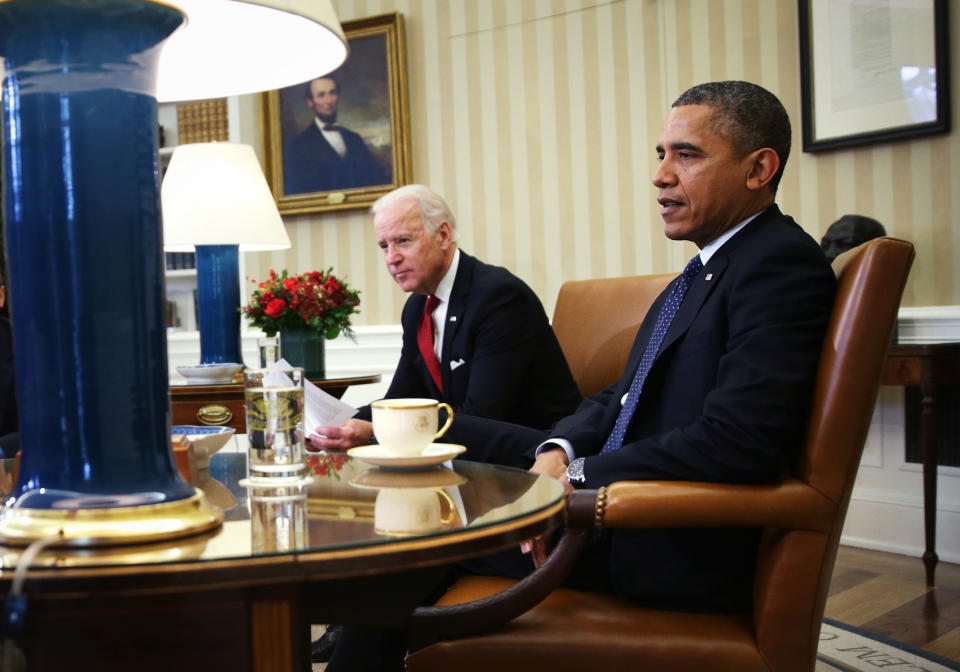The US is ‘on the backfoot’ in Asia on trade : Former U.S. Ambassador
President-elect Joe Biden promised a return to multilateralism when it comes to U.S. foreign policy.
That may prove to be a tall hurdle in Asia, particularly on trade. In forging ahead with a historic Regional Comprehensive Economic Partnership (RCEP), the 15 member countries led by China sent a strong message to Washington, that it can move forward without the United States.
Speaking to Yahoo Finance Live, Ambassador Kurt Tong, partner at the Asia Group said the new agreement, which covers roughly a third of global economic output, puts the U.S. “on the backfoot in Asia” as a new administration looks to reverse President Donald Trump’s “America First” approach to trade.
“It's a significant development for China, in terms of ensuring its access to Southeast Asian markets, and also creating some channels to Japan,” Tong, who served as consul general and chief of mission in Hong Kong and Macau, said about RCEP. “The countries of the region do not want to be forced to choose between the United States and China, in terms of trade, investment, and economic interaction.”
‘They must do business’ with China
The new bloc marks the culmination of an eight-year long effort by China, to craft a regional trade agreement, considered Beijing’s counter to U.S. influence in the Asia Pacific region. Member nations include Japan, New Zealand, Australia, South Korea, and the 10-member Association of Southeast Nations.
The initial economic impact of RCEP is expected to be limited, given that tariffs among many member countries have already been lowered through bilateral or smaller multilateral agreements. Still, the scale of the pact, with the region accounting for 2.2 billion people, is likely to lead to a more unified trading system, and allow Beijing to wield more influence in the region.
Tong, who also served as U.S. Ambassador for Asia-Pacific Economic Cooperation (APEC), said the agreement isn’t likely to jeopardize close trade relations America shares with countries like Japan and South Korea.
“I think that from their perspective, China is this enormous and important neighbor. They must do business with it,” Tong said. “They also worry about China's projection of power... and so they have to get along with China but they also see it as a danger. They will balance that and find ways to have stable, and productive relationships with China, even as they continue to really want to be close to the United States for defense purposes, as well as economic development purposes.”
A potential return to TPP
How the incoming Biden administration re-engages with the region’s trading partners remains a question mark. While the U.S., under President Barack Obama and Vice President Biden, led the negotiations on the 12-nation Trans Pacific Partnership (TPP), to counter China’s economic clout in the region, Trump signed an executive order withdrawing from the agreement in 2017. The remaining countries moved forward with their own free-trade pact, the Comprehensive and Progressive Agreement for TPP in 2018.

Tong, who helped craft the original TPP, said Biden is unlikely to negotiate Washington’s return, with strong opposition against the pact back home.
“The path to getting back to TPP I think actually goes through the United States, and through our own ability to create sufficient economic security for dislocated workers in the United States, so there is confidence that it's wise for the US to be opening its doors to international competition,” Tong said.
In the absence of large regional trade pacts, President-elect Biden is likely to seek out bilateral agreements, Tong said. India may prove to be a big opportunity. The South Asian nation withdrew from RCEP negotiations last year, after raising concerns about how the trade pact would hurt Indian manufacturers.
“India is a key factor in this and it would make sense for the United States to reach out, bilaterally to all of the country's important countries in the region and accomplish as much as it can in discrete ways in improving our economic relationship and making those nations feel like, feel the United States presence.”
Akiko Fujita is an anchor and reporter for Yahoo Finance. Follow her on Twitter @AkikoFujita
74% of executives say climate change poses risks to job security: survey
America’s divisiveness ‘will make it a lot harder on the working class’ : Ian Bremmer
Prop 22 explained: California voters embrace legal exemptions for Uber and Lyft
Coronavirus stimulus: ‘That’s the only way we actually survived’

 money
money 
